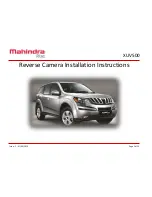Reviews:
No comments
Related manuals for CR-S700R

BC 50
Brand: Garmin Pages: 8

XDS-2288
Brand: IAdea Pages: 9

NXT rio
Brand: IDS Pages: 29

XUV500
Brand: Mahindra Pages: 12

FDJ-S31
Brand: Canon Pages: 3

iGO CAM 600
Brand: Uniden Pages: 20

FH-SMX21R
Brand: Omron Pages: 2

IC-1500 series
Brand: Edimax Pages: 2

SI-C600N
Brand: Meiji Techno Pages: 16

DiMAGE G500
Brand: Konica Minolta Pages: 126

AB-1600CL
Brand: JAI Pages: 61

PV-R4
Brand: Casio Pages: 143

FL-900R
Brand: Olympus Pages: 220

Quicker 400IIM
Brand: Godox Pages: 9

DM-65
Brand: Greenlee Pages: 72

Sony E mount
Brand: Samyang Pages: 11

X-8 Sports
Brand: Rollei Pages: 46

XPR-E
Brand: Samsung Pages: 13



















